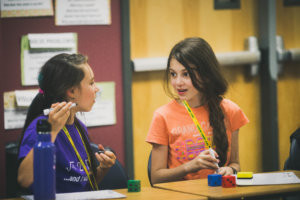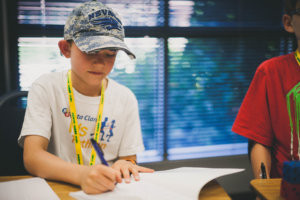Determining if your child is gifted can be a complex journey, but lawyergift.com is here to guide you through the process with valuable insights and resources. Understanding the signs of giftedness early on can empower you to provide the best support and enrichment opportunities for your child’s unique talents. Explore the key indicators, testing options, and support systems available to help your child thrive.
1. What Does It Mean for My Child to Be Gifted?
Giftedness in children means they possess abilities significantly above the norm for their age, a definition supported by the National Association for Gifted Children (NAGC). These abilities can manifest in various areas. It could be intellectual prowess, creative innovation, musical talent, or academic excellence, either generally or in specific subjects like math, language arts, or science.
1.1 How Can I Spot Signs of Giftedness at Home?
Keep an eye out for these common indicators:
- Constant Mental Stimulation: An intense and ongoing need for intellectual engagement.
- Rapid Learning: The capacity to quickly absorb and process complex information.
- In-Depth Exploration: A desire to delve deeply into subjects, exploring them beyond the surface level.
- Insatiable Curiosity: Demonstrated through endless questions and a thirst for knowledge.
- Advanced Comprehension: Understanding materials several grade levels above their peers.
- Emotional Depth: Displaying surprising emotional depth and sensitivity at a young age.
- Enthusiastic Interests: Passionate about unique and niche topics.
- Mature Humor: A quirky or sophisticated sense of humor.
- Creative Problem-Solving: Exceptional abilities in creative problem-solving and imaginative expression.
- Efficient Information Absorption: Learning quickly with minimal repetition.
- Heightened Awareness: Keenly aware of themselves, social dynamics, and global issues.
Note: Keep in mind that gifted children may not exhibit all these traits.
 Child intently focused on a book, showcasing their thirst for knowledge
Child intently focused on a book, showcasing their thirst for knowledge
1.2 What Should I Do After Noticing These Signs?
Once you have identified these traits in your child, consider the following actions:
- Research Local Policies: Because gifted education isn’t federally mandated, understanding local identification policies is essential.
- Explore lawyergift.com: Discover unique and meaningful gifts that can stimulate your child’s intellectual curiosity and creativity.
- Consult Professionals: Consider seeking professional assessment to better understand your child’s capabilities and needs.
2. Gifted Testing: Should I Have My Child Tested?
Deciding whether to test your child for giftedness hinges on your goals and the questions you want answered. It’s a good idea to write down what you hope to learn about your child’s abilities.
2.1 Why Should I Consider Gifted Testing?
Testing can help:
- Program Entrance: Gain admission to specific gifted programs. Check which tests are accepted by those programs.
- School Communication: Share results with the school to inform their understanding of your child’s learning profile.
- Addressing Concerns: Identify and address concerns about your child’s academic performance or behavior.
- Educational Placement: Determine the best educational placement and access to talent development programs.
2.2 What Are My Testing Options?
- Above-Level Tests: Cost-effective options like the PSAT 8/9, ACT, or SAT. These tests are designed for older students and can reveal a gifted child’s true potential.
- Individualized Tests: Administered by a testing professional, such as achievement or intelligence tests.
- Comprehensive Assessment: A thorough evaluation to understand your child’s strengths, challenges, and needs in educational and social settings.
2.3 What Are The Benefits of a Comprehensive Assessment?
A comprehensive assessment offers a deeper understanding of your child’s abilities, helping you tailor their educational and social environments to meet their specific needs. This approach goes beyond simple testing by evaluating strengths, weaknesses, and their impact on learning and social interactions.
According to a study by the Davidson Institute, comprehensive assessments provide valuable insights that testing alone cannot capture.
3. What’s the Best Age to Test My Child for Giftedness?
Generally, testing is most reliable between the ages of six and nine, however, it’s important to consider your child’s readiness and individual circumstances. While some assessments are approved for children as young as two, experts suggest waiting until the child is ready to enter school. Testing too early might not yield reliable results.
3.1 How Should I Interpret Test Results?
Remember, test scores are just tools to understand your child better. They don’t change who your child is. Use the results to gain insights and guide your decisions.
 A child happily working on a puzzle, representing the joy of learning and discovery
A child happily working on a puzzle, representing the joy of learning and discovery
3.2 How Can I Use Test Results to Support My Child?
Test results can inform various strategies to support your child’s development.
- Curriculum Adjustments: Tailor their learning experience to match their advanced abilities.
- Enrichment Activities: Engage them in activities that stimulate their curiosity and creativity.
- Social Opportunities: Connect them with peers who share similar interests and intellectual levels.
4. Which Gifted Tests Are Recommended for My Child?
The “right” test depends on your goals. If a professional is assessing your child, they will recommend tests based on their expertise and your specific concerns. For academic planning, consider tests familiar to your child’s educators.
4.1 What Tests Should I Discuss with My Child’s School?
Intelligence tests might not provide as much educational planning information as achievement tests, which offer grade and age equivalents, or proficiency tests administered by the school.
4.2 What Are Above-Level Tests?
These tests offer a higher ceiling, allowing for a more accurate assessment of your child’s abilities. Talent searches often use these tests, such as the PSAT 8/9 (designed for 8th and 9th graders but can be taken by students in 3rd through 6th grade) and the SAT/ACT (designed for high school juniors and seniors but can be taken by students starting in 6th grade).
4.3 Where Can I Find More Information?
Consulting with a therapist or psychologist is essential to determine the best testing or assessment approach for your child. They can discuss specifics and address any concerns you may have.
5. How Do I Find a Qualified Testing Professional for My Child?
Finding the right professional can be challenging, but resources are available to help.
5.1 Where Can I Start My Search?
- Gifted Testers and Therapists List: Many organizations maintain lists of qualified professionals.
- State Gifted Associations: Your state’s gifted association can provide local referrals.
- Special Education Advocacy Groups: Regional groups may offer recommendations.
- Local Parent Groups: Connect with other parents for recommendations.
- School Counselors: Your child’s school counselor, psychologist, or social worker may offer referrals.
- Online Resources: Websites like SENG, the 2e Newsletter, and Hoagies’ Gifted provide lists of experienced professionals.
5.2 What Should I Ask Potential Testers?
The Davidson Institute recommends asking specific questions to identify a knowledgeable professional. If the answers aren’t satisfactory, seek a second opinion.
6. Key Questions to Ask a Potential Gifted Assessment Professional
When seeking a professional to evaluate your child, asking the right questions ensures you find someone qualified and suitable.
6.1 Credentials and Training
- What is your training and background in gifted assessment?
- Are you licensed and/or certified to practice as a testing professional?
- What do you consider your specific area of expertise to be?
6.2 Experience with Gifted Children
- How much experience have you had in testing very bright or precocious children?
- What is your experience working with a child of this age and with children of advanced cognitive abilities?
- Are you licensed to make mental health diagnoses? Are you familiar with the ways in which gifted students can be misdiagnosed, as well as how mental health diagnoses often present in intellectually advanced students?
6.3 About the Tests
- What tests do you typically administer in the context of a comprehensive assessment? How do you decide which tests to utilize?
- What is your practice when you don’t get the information you need from a standardized test; how do you gather other types of information about a child?
- If a child reaches the end of a subtest or test without reaching a ceiling, how do you interpret that, and how do you indicate that in your assessment report?
- How do you evaluate issues of underachievement in gifted children?
- What is your experience with “out-of-level” testing?
6.4 Information About the Child
- What is the array of tests and information you have or need to have to evaluate my child?
- How much do you want to know about my child’s previous testing?
- Note: Inform the examiner of any previous testing results. If results are conflicting, ask for an interpretation. Share evidence of your child’s talents from educational, home, and community settings.
6.5 Preparing Your Child
- How should I best prepare my child to be assessed?
- How do you prepare my child?
- How long should we expect the assessment to last?
- How are break times determined?
- Is there anything we should bring to the assessment to ensure my child is comfortable?
 A child happily engaged in a creative activity, highlighting the importance of nurturing their talents
A child happily engaged in a creative activity, highlighting the importance of nurturing their talents
6.6 Using Results for Educational Planning
- Are you familiar with gifted program eligibility at the state and local level?
- How would you decide if a child is a candidate for grade or subject matter acceleration?
- Are your test reports accepted by local schools and programs for the gifted as part of their admissions process?
- Pragmatically, how can the information you expect to gather be put to use in the service of my child?
- Have you worked with students in my school system before? If so, how would you describe your effectiveness?
- Are you available to explain the educational implications of the test results to school officials? Is there an additional fee for this type of meeting?
6.7 Follow-Up
- How do you suggest the results be explained to my child? Are you available for discussing this with my child, or will you advise us on how to do this?
- If the results seem inconsistent with what was anticipated, what would be the next course of action?
- What type of follow-up will we receive? Will you be preparing a written report for us? What will be included in this report? When will we receive the report?
- What are your procedures for providing results to my child’s school?
- Note: Some psychologists provide a sanitized report to the school, addressing test results and recommendations without including sensitive family dynamics or labels.
7. More Resources for Gifted Children and Their Families
Many organizations provide support and resources for gifted children and their families.
7.1 What Resources Are Available?
- Gifted Organizations: Organizations like the National Association for Gifted Children (NAGC) and Supporting Emotional Needs of the Gifted (SENG) offer valuable information and support.
- Online Communities: Websites and forums dedicated to giftedness provide a space for parents to connect and share experiences.
- Educational Programs: Summer programs, workshops, and specialized schools cater to the unique needs of gifted learners.
- Books and Articles: Numerous publications offer insights into the characteristics of gifted children and strategies for supporting their development.
8. Gift Ideas for Gifted Children
Choosing the right gifts can further stimulate a gifted child’s mind and passions.
8.1 Stimulating and Educational Gifts
- Science Kits: These kits foster curiosity and hands-on learning.
- Advanced Building Sets: Complex sets like LEGO Architecture or Technic challenge problem-solving skills.
- Coding Games: Introduce coding concepts in a fun and engaging way.
- Telescopes: Encourage an interest in astronomy and exploration.
- Museum Memberships: Provide access to ongoing learning experiences.
8.2 Creative and Artistic Gifts
- High-Quality Art Supplies: Premium art supplies can unleash creativity.
- Musical Instruments: Introduce a new instrument or provide advanced lessons.
- Writing Sets: Encourage creative writing with beautiful journals and pens.
- Photography Equipment: Foster an interest in visual arts with cameras and editing software.
8.3 Mind-Expanding and Intellectual Gifts
- Strategy Games: Games like chess, Settlers of Catan, or Ticket to Ride enhance strategic thinking.
- Logic Puzzles: Challenge problem-solving skills with Sudoku, KenKen, or Rubik’s Cubes.
- Subscription Boxes: Curated boxes with educational and engaging activities.
- Books: Age-appropriate books on advanced topics can fuel intellectual curiosity.
- Robotics Kits: Allow your child to build and program robots, combining engineering and coding skills.
According to a survey by lawyergift.com, parents of gifted children find that educational toys and games significantly contribute to their child’s intellectual growth.
9. Addressing Challenges and Misconceptions
Gifted children often face unique challenges and are subject to common misconceptions.
9.1 Common Challenges
- Perfectionism: The pressure to excel can lead to excessive self-criticism.
- Underachievement: Lack of challenge can result in boredom and disengagement.
- Social Isolation: Difficulty connecting with peers who don’t share their interests.
- Emotional Intensity: Heightened sensitivity can lead to emotional challenges.
9.2 Common Misconceptions
- Gifted Children Don’t Need Help: They may require specialized support to reach their full potential.
- Giftedness Guarantees Success: Success requires effort, resilience, and a supportive environment.
- Gifted Children Are Good at Everything: They may excel in some areas but struggle in others.
- Gifted Programs Are Elitist: They provide appropriate challenges and support for advanced learners.
10. What Are The Five Main Search Intentions For “How Do I Know If My Child Is Gifted?”
Understanding the search intentions behind “How Do I Know If My Child Is Gifted” helps tailor content to meet user needs effectively. Here are five main search intentions:
10.1 Informational
Parents seek general information about the characteristics and signs of giftedness in children.
- Example: “What are the common traits of a gifted child?”
- Content: Provide a comprehensive list of signs, behaviors, and characteristics that indicate giftedness.
10.2 Diagnostic
Parents want to determine if their child exhibits enough of these traits to warrant further investigation or testing.
- Example: “My child learns very quickly and asks a lot of questions – is this giftedness?”
- Content: Offer checklists, questionnaires, or guides to help parents assess their child’s potential giftedness.
10.3 Evaluative
Parents are researching the best methods or tests to accurately evaluate their child’s abilities.
- Example: “Which tests are most reliable for identifying gifted children?”
- Content: Compare different testing options, their pros and cons, and recommendations from experts.
10.4 Resource-Seeking
Parents look for resources such as professionals, organizations, or programs that can support gifted children.
- Example: “Where can I find a qualified psychologist to test my child for giftedness in Washington, D.C.?”
- Content: Provide directories, lists, or links to relevant professionals, organizations, and programs.
10.5 Action-Oriented
Parents need specific steps to take after identifying signs of giftedness in their child, such as how to enroll them in gifted programs.
- Example: “How do I enroll my gifted child in advanced classes?”
- Content: Offer step-by-step guides, advice on advocating for your child’s needs, and information on educational opportunities.
By addressing these search intentions, content can better serve the needs of parents seeking to understand and support their gifted children.
 A family happily engaged in a learning activity together, reinforcing the importance of support and encouragement
A family happily engaged in a learning activity together, reinforcing the importance of support and encouragement
Discovering whether your child is gifted is a journey that requires careful observation, informed decisions, and access to the right resources. lawyergift.com is here to support you every step of the way with unique and meaningful gifts that nurture your child’s talents and passions.
Ready to explore more? Visit lawyergift.com today to find the perfect gifts that inspire and challenge your gifted child. Browse our curated collection and let us help you celebrate their extraordinary potential.
Address: 3210 Wisconsin Ave NW, Washington, DC 20016, United States
Phone: +1 (202) 624-2500
Website: lawyergift.com
FAQ: Identifying Giftedness in Children
1. What is the definition of giftedness?
Giftedness refers to children who possess abilities significantly above the norm for their age, as defined by the National Association for Gifted Children (NAGC).
2. What are the key signs of giftedness in children?
Key signs include a constant need for mental stimulation, rapid learning, in-depth exploration of subjects, insatiable curiosity, advanced comprehension, emotional depth, unique interests, a mature sense of humor, creative problem-solving, efficient information absorption, and heightened awareness.
3. At what age is it best to test a child for giftedness?
Testing is generally most reliable between the ages of six and nine, although assessments can be administered to younger children if necessary.
4. Which tests are recommended for identifying gifted children?
Recommended tests include above-level tests like the PSAT 8/9, SAT, and ACT, as well as individualized achievement and intelligence tests administered by professionals.
5. Where can I find a qualified professional to test my child for giftedness?
Qualified professionals can be found through gifted testers and therapists lists, state gifted associations, special education advocacy groups, local parent groups, school counselors, and online resources like SENG and Hoagies’ Gifted.
6. What questions should I ask a potential gifted assessment professional?
Important questions include their training and background, experience with gifted children, the types of tests they administer, and how they use the results for educational planning.
7. How can I prepare my child for giftedness testing?
Preparation includes ensuring your child is well-rested, comfortable, and informed about the assessment process. Follow any specific instructions provided by the testing professional.
8. What are some common challenges faced by gifted children?
Common challenges include perfectionism, underachievement, social isolation, and emotional intensity.
9. What types of gifts are suitable for gifted children?
Suitable gifts include science kits, advanced building sets, coding games, telescopes, museum memberships, high-quality art supplies, musical instruments, and strategy games. Visit lawyergift.com for unique gift ideas.
10. How can I support my gifted child’s educational needs?
Support includes tailoring their learning experience, providing enrichment activities, connecting them with like-minded peers, and advocating for their needs within the educational system.
